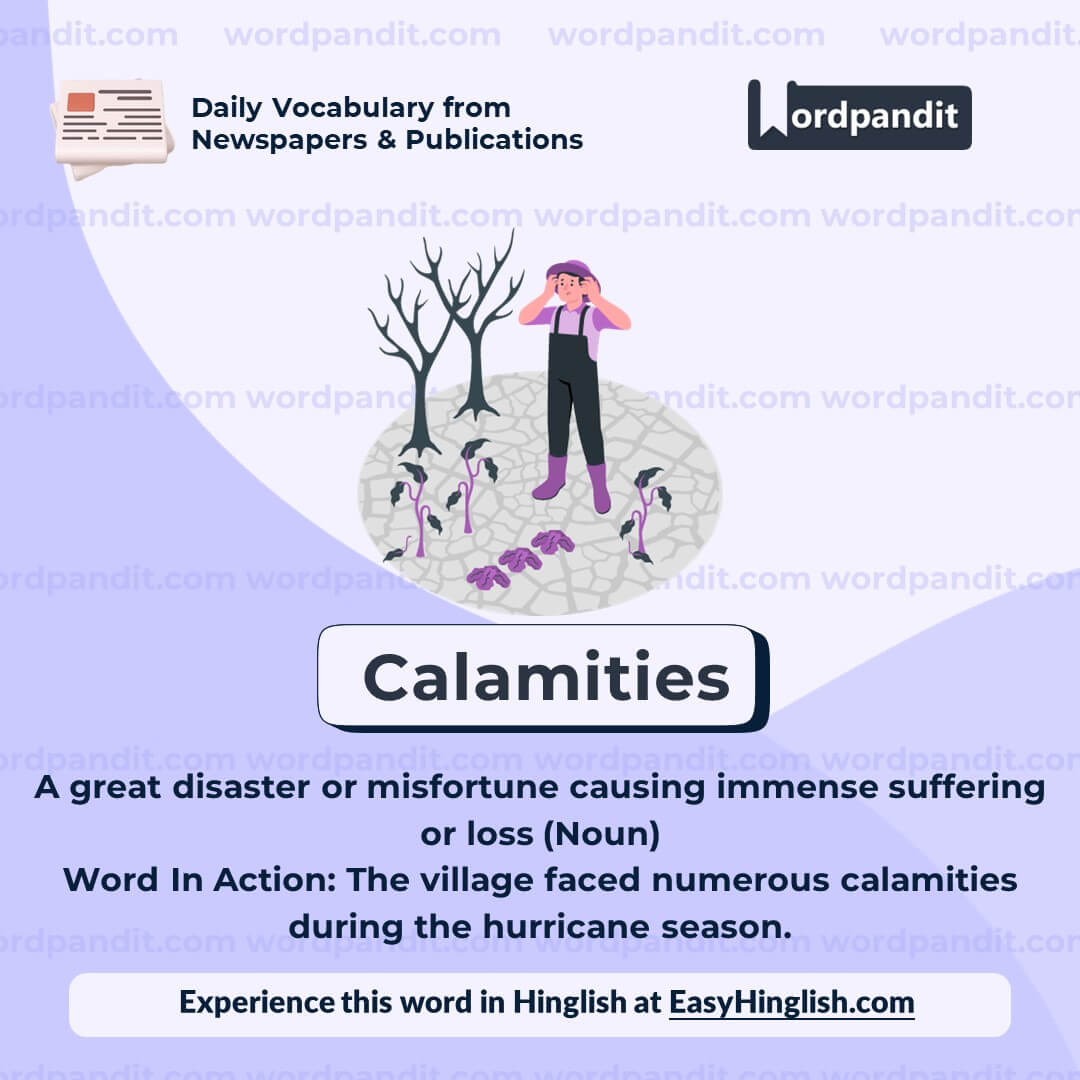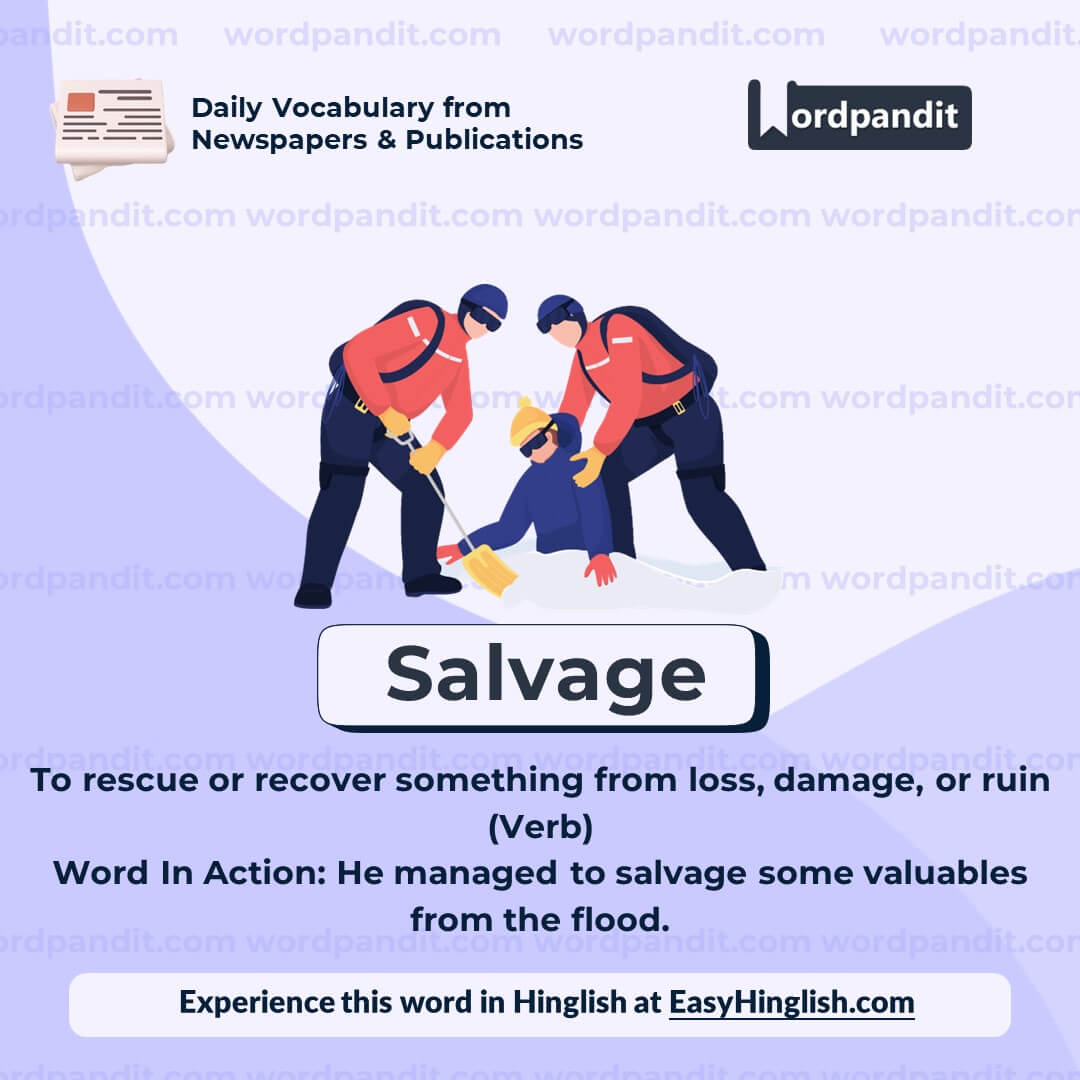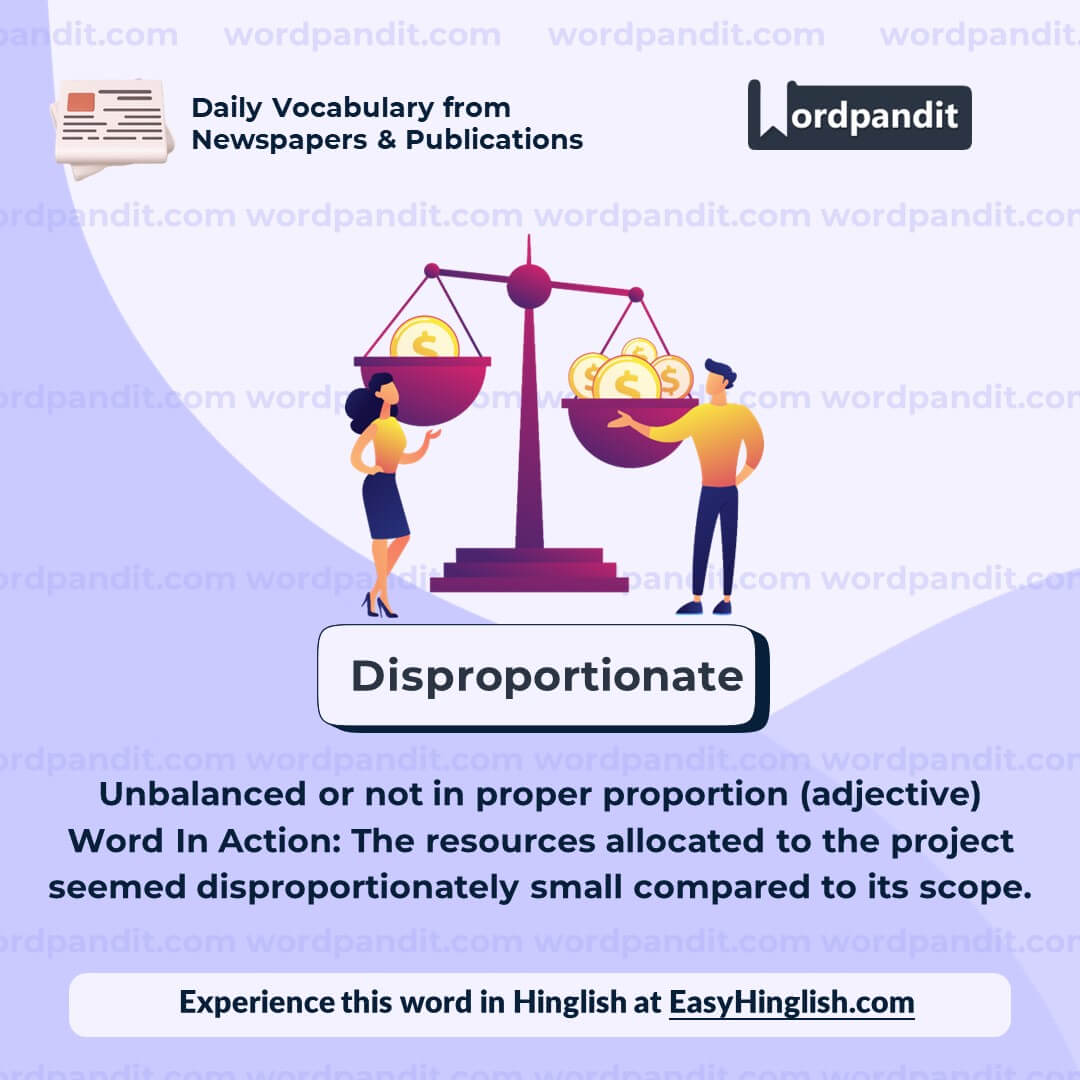Daily Vocabulary from Indian Newspapers and Publications
Welcome to Wordpandit’s Indian Vocabulary Hub
At Wordpandit, we understand the importance of staying rooted in the local context while expanding your language skills. This section focuses on enriching your vocabulary with words and phrases drawn from India’s leading newspapers and publications, ensuring you're learning vocabulary that is practical, relevant, and uniquely Indian.
Why Indian Sources Matter
We believe that the best way to master any language is by immersing yourself in local content. That’s why we carefully curate vocabulary from top Indian publications, including:
- The Hindu
- The Times of India
- The Economic Times
- Hindustan Times
- Live Mint
- The Indian Express
- And many others...
Stay Updated, Stay Relevant
With daily updates from Indian news sources, you’ll be consistently learning words that reflect the trends and shifts in Indian society and culture. Our focus is to provide vocabulary that enhances your understanding of the language in an Indian context.
How Wordpandit Supports Your Goals
Whether you’re preparing for exams, aiming to improve your professional communication, or simply want to stay connected with the latest Indian vocabulary, Wordpandit is here to guide you every step of the way.
Learn with a Practical Approach
Our interactive learning methodology includes real-world examples, engaging activities, and context-specific usage to ensure that every word becomes part of your active vocabulary.
Dive into Indian Vocabulary Today!
Why Choose Wordpandit?
Practical Learning: Focus on words you'll actually encounter in real-world reading, enhancing your comprehension and communication skills.
Diverse Content: From current affairs to scientific breakthroughs, our varied sources expose you to vocabulary across multiple domains.
Effortless Integration: Make Wordpandit a part of your daily routine. Just a few minutes each day can significantly boost your lexicon over time.
Your Path to Vocabulary Mastery
- Visit our Daily Vocabulary section regularly
- Explore new words and their usage in context
- Practice incorporating these words into your own writing and speech
- Track your progress as your vocabulary expands
Start Your Journey Today
Embark on your vocabulary enhancement journey with Wordpandit. By consistently engaging with our daily posts, you'll build a robust vocabulary that serves you well in academic, professional, and personal contexts.
Remember, a word a day keeps linguistic limitations at bay. Make Wordpandit your daily companion in the quest for vocabulary excellence!
WORD-1: Stoutly
Context:
"Unsurprisingly, the three wise men of the re-constituted Commission did not disappoint their mentor. In a year that saw several important polls, they stoutly refused to check hate speech, including the obnoxious." - The Wire
Explanatory Paragraph:
The word "stoutly" describes doing something with determination, courage, or firmness. It implies a strong-willed or resolute manner, often in the face of opposition or difficulty.
Meaning: In a determined or forceful way (Adverb)
Pronunciation: Stout-lee
Difficulty Level: ⭐⭐⭐ Intermediate
Etymology: Derived from the Middle English word "stout," meaning bold or brave, which traces back to Old French "estout" and ultimately Germanic roots meaning proud or resolute.
Synonyms & Antonyms:
Synonyms: Firmly, resolutely, determinedly, staunchly
Antonyms: Weakly, hesitantly, indecisively, reluctantly
Usage Examples:
- She stoutly defended her position, even when faced with criticism.
- The team stoutly resisted their opponents' attempts to score.
- He stoutly refused to compromise on his principles.
- Despite the challenges, the villagers stoutly rebuilt their homes after the flood.
Cultural Reference:
"Stoutly" can often be seen in historical texts describing battles or speeches, where leaders are described as standing stoutly against adversity.
Think About It:
Can standing "stoutly" for one's beliefs sometimes lead to stubbornness? Where should one draw the line?
Quick Activity:
Write a sentence using "stoutly" to describe how someone might act in a situation requiring courage or determination.
Memory Tip:
Think of a "stout" beer: bold, strong, and full-bodied—just like acting stoutly means being strong and resolute.
Real-World Application:
"Stoutly" is often used in political or legal contexts to describe firm resistance or advocacy. It is also common in personal narratives of resilience and courage.
WORD-2: Calamities
Context:
"Twenty years after one of the most devastating calamities in history struck south Asia, my memories are as fresh as yesterday." - The Wire
Explanatory Paragraph:
The word "calamities" refers to disastrous events that cause great harm, suffering, or destruction. It is often used to describe natural disasters, accidents, or other catastrophic situations that leave lasting impacts on individuals and communities.
Meaning: A great disaster or misfortune causing immense suffering or loss (Noun).
Pronunciation: kuh-LAM-ih-teez
Difficulty Level: ⭐⭐⭐ Intermediate
Etymology: From Latin "calamitas," meaning "damage or disaster," originally related to crop failures.
Synonyms & Antonyms:
Synonyms: Catastrophes, disasters, misfortunes, adversities
Antonyms: Blessings, fortunes, boons, miracles
Usage Examples:
- The region faced several calamities, including floods and earthquakes, within a span of two years.
- History books often document the calamities that shaped the destiny of civilizations.
- Efforts to mitigate the effects of environmental calamities are increasingly critical.
- During wartime, economic calamities often exacerbate the struggles of ordinary citizens.
Cultural Reference:
"Calamities often serve as a reminder of human resilience and the need for solidarity in times of crisis." - Commonly expressed sentiment in humanitarian literature.
Think About It:
How can societies better prepare for calamities to minimize their impact on vulnerable populations?
Quick Activity:
List three historical calamities and their long-term impacts on the affected regions.
Memory Tip:
Think of "calamities" as events that cause "calamity," emphasizing chaos and destruction.
Real-World Application:
The term "calamities" is frequently used in news reporting, literature, and disaster management to highlight the severity of an event and its impact on humanity.
WORD-3: Enthrall
Context:
"As a year that saw the Adanis and Ambanis capture disproportionate media space by employing the ancient Roman principle, panem et circenses, or bread and circuses, to enthrall the paparazzi and pauper alike." - The Wire
Explanatory Paragraph:
The word "enthrall" is often used to describe the act of capturing someone’s complete attention, often in a way that is mesmerizing or enchanting. When you are enthralled by something, you are so captivated by its allure or excitement that you are metaphorically "held captive."
Meaning: To captivate or charm completely; to hold spellbound. (Verb)
Pronunciation: en-thrawl
Difficulty Level: ⭐⭐⭐ Intermediate
Etymology: Derived from the Old English "enthrallen," meaning "to enslave," with "thrall" referring to a servant or captive.
Synonyms & Antonyms:
Synonyms: Captivate, charm, mesmerize, enchant, fascinate
Antonyms: Bore, repel, disenchant, disinterest
Usage Examples:
- The magician’s performance was so spectacular that it enthralled the entire audience.
- The vivid descriptions in the novel enthralled readers, transporting them to another world.
- Her storytelling abilities are so remarkable that she can enthrall even the most distracted listeners.
- The sight of the aurora borealis enthralled the travelers, leaving them in awe of nature’s wonders.
Cultural Reference:
"Shakespeare’s plays have enthralled audiences for centuries with their timeless themes and masterful storytelling." - Common cultural observation
Think About It:
Why do you think humans are so easily enthralled by certain stories, performances, or ideas?
Quick Activity:
Think of a book, movie, or performance that enthralled you recently. Write a few sentences about what made it so captivating.
Memory Tip:
Think of "enthrall" as "enter the hall of fascination," where something grabs your attention completely.
Real-World Application:
The word "enthrall" is often used in marketing and entertainment to describe how a product or performance captivates its audience, such as an enthralling advertisement or movie trailer.
WORD-4: Salvage
Context:
"An old fisherwoman shouted at me to run as she herself ran barefoot, clutching a small bundle of clothes, the little relief she had managed to salvage of her life." - The Wire
Explanatory Paragraph:
The word "salvage" refers to the act of saving or rescuing something from potential loss or destruction, often under challenging circumstances. It is commonly used in the context of recovering valuable items, memories, or even situations from disaster or damage.
Meaning: To rescue or recover something from loss, damage, or ruin (Verb).
Pronunciation: SAL-vij
Difficulty Level: ⭐⭐⭐ Intermediate
Etymology: From Old French "salvage" and Latin "salvare," meaning "to save."
Synonyms & Antonyms:
Synonyms: Rescue, recover, retrieve, save
Antonyms: Abandon, lose, forfeit
Usage Examples:
- The team worked tirelessly to salvage what remained of the ancient artifacts after the earthquake.
- She tried to salvage her reputation after the controversial decision.
- The fishermen managed to salvage their boats before the storm worsened.
- Efforts are being made to salvage the damaged files from the corrupted hard drive.
Cultural Reference:
"Salvage" is a key concept in maritime law, referring to the act of rescuing a ship or its cargo from danger. This principle has historical roots in seafaring cultures.
Think About It:
In what ways can people "salvage" emotional well-being or relationships during times of crisis?
Quick Activity:
Describe a situation in which you had to salvage something valuable or meaningful, and how you felt during the process.
Memory Tip:
Think of "salvage" as "saving" something from the "edge" of disaster.
Real-World Application:
The word "salvage" is often used in disaster management, environmental recovery, and even in everyday contexts like salvaging relationships, opportunities, or projects.
WORD-5: Disproportionate
Context:
"As a year that saw the Adanis and Ambanis capture disproportionate media space by employing the ancient Roman principle, panem et circenses, or bread and circuses, to enthrall the paparazzi and pauper alike." - The Wire
Explanatory Paragraph:
The word "disproportionate" refers to something that is out of proportion or does not have a balanced or fair relationship in size, amount, or importance when compared to other things. It often suggests an excessive or insufficient allocation relative to what is reasonable or expected.
Meaning: Unbalanced or not in proper proportion (adjective).
Pronunciation: dis-proh-POR-shun-it
Difficulty Level: ⭐⭐⭐ Intermediate
Etymology: From Latin "dis-" (apart, away) and "proportio" (relation of parts), indicating something not aligned or in harmony.
Synonyms & Antonyms:
Synonyms: Unequal, excessive, imbalanced, unfair
Antonyms: Equal, proportionate, balanced, fair
Usage Examples:
- The punishment was disproportionate to the minor mistake he made.
- We noticed a disproportionate amount of resources being allocated to one department over others.
- The small town received disproportionate attention after the celebrity moved there.
- The disproportionate cost of living in the city drives many residents to relocate to the suburbs.
Cultural Reference:
"Disproportionate representation in the media has been a recurring topic in discussions about diversity and inclusion." - Social Awareness Review
Think About It:
How can we address issues of disproportionate resource allocation in areas like education, healthcare, or media coverage?
Quick Activity:
Think of a situation where you noticed something was disproportionate. Write a sentence explaining what it was and why it seemed unfair or imbalanced.
Memory Tip:
Remember "disproportionate" by associating "dis-" with disorder and "proportionate" with balance—something "disproportionate" is out of balance!
Real-World Application:
"Disproportionate" is often used in conversations about social justice, economics, and statistics to highlight inequalities or imbalances, such as unequal pay or uneven media coverage.


















